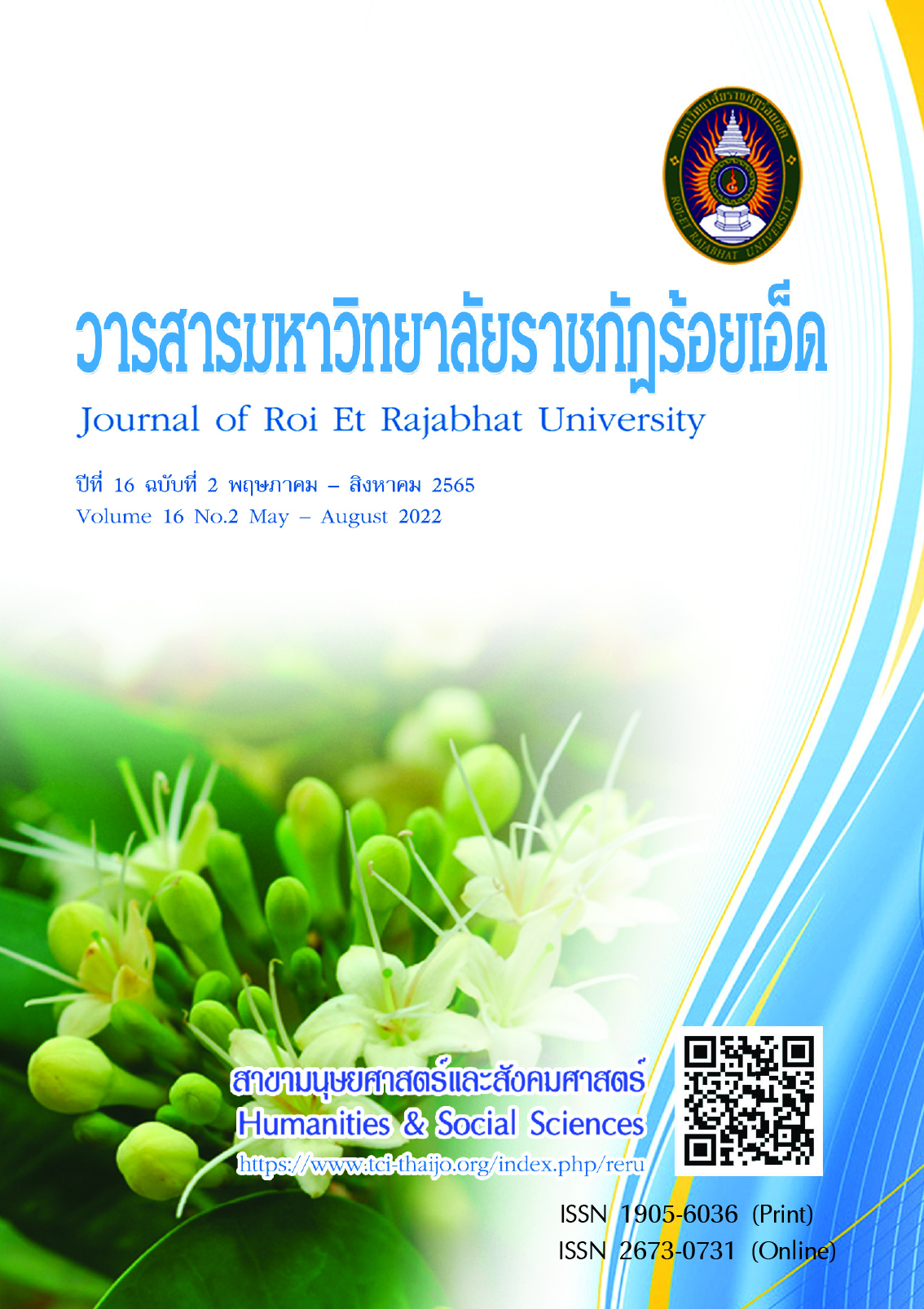The Development of Critical Thinking for Student Teachers, Chandrakasem Rajabhat University by Using Powerful Questions
Keywords:
ทักษะการคิดอย่างมีวิจารณญาณ,นักศึกษาครู,เทคนิคคำถามทรงพลังAbstract
The purposes of this research were 1) to develop critical thinking for student teachers by using powerful questions and 2) to compare critical thinking for student teachers before and after using powerful questions. The samples were 30 of student teachers, Bachelor of Education, ChandrakasemRajabhat University in
the second semester, academic year 2018 which were selected by cluster random sampling. The research instruments were 1) The 5 activities and powerful questions that enhance critical thinking, and 2) Powerful questions and critical thinking assessment. Statistics for data analysis include frequency, percentage, mean, standard deviation and t-test.
The results of the study were 1) critical thinking of student teachers by using powerful questions before the experiment found that the critical thinking ability score in overall score was at fair level and after the experiment, it was found that the critical thinking score was at good level. 2) A comparison
of critical thinking by using powerful questions before and after the experiment, it was found that the critical thinking score after the experiment was higher than before the experiment at statistical significance level of 0.05
References
ชัยวัฒน์ สุทธิรัตน์. (2559). เทคนิคการใช้คำถามพัฒนาการคิด (พิมพ์ครั้งที่ 5). กรุงเทพฯ: วีพรินท์ (1991).
ดวงกมล สินเพ็ง. (2553). การพัฒนาผู้เรียนสู่สังคมแห่งการเรียนรู้ : การจัดการเรียนการสอนที่เน้นผู้เรียนเป็นศูนย์กลาง (พิมพ์ครั้งที่ 2). กรุงเทพฯ: วี พริ้นท์ (1991).
ทิศนา แขมมณี. (2556). ศาสตร์การสอน : องค์ความรู้เพื่อการจัดกระบวนการเรียนรู้ที่มีประสิทธิภาพ (พิมพ์ครั้งที่ 17). กรุงเทพฯ: จุฬาลงกรณ์มหาวิทยาลัย.
ปกรณ์ วงศ์รัตนพิบูลย์. (2558). ความแตกต่างของคำถามทรงพลังกับคำถามทั่ว ๆ ไป. สืบค้นเมื่อ 1 มีนาคม 2558, จาก https://www.entraining.net/manual/b7/ความแตกต่างของคำถามทรงพลังกับคำถามทั่วไป
ปณิตา วรรณพิรุณ. (2551). การพัฒนารูปแบบการเรียนบนเว็บแบบผสมผสานโดยใช้ปัญหาเป็นหลักเพื่อพัฒนาการคิดอย่างมีวิจารณญาณของนิสิตปริญญาบัณฑิต. ดุษฎีนิพนธ์ ครุศาสตรดุษฎีบัณฑิต สาขาวิชาเทคโนโลยีและสื่อสารการศึกษา. กรุงเทพฯ: จุฬาลงกรณ์มหาวิทยาลัย.
ประพันธ์ศิริ สุเสารัจ. (2551). การพัฒนาการคิด. กรุงเทพฯ: 9119 เทคนิคพริ้นติ้ง.
ลัดดาวัลย์ ไวยสุระสิงห์. (2554). ศึกษาการพัฒนารูปแบบการเรียนการสอนตามแนวคิดการเรียนรู้ตามสภาพจริงเพื่อเสริมสร้างผลสัมฤทธิ์ทางการเรียนและความสามารถในการคิดอย่างมีวิจารณญาณของนักศึกษาพยาบาล วิทยาลัยพยาบาลบรมราชชนนี สุพรรณบุรี. วารสารการพยาบาลและการศึกษา, 4(3), 6-25.
วัชรี แซงบุญเรือง ประวิทย์ สิมมาทัน และกนก สมะวรรธนะ. (2560). ผลการใช้รูปแบบการเรียนรู้ที่ส่งเสริมทักษะการคิดอย่างมีวิจารณญาณภายใต้สภาพแวดล้อมทางการเรียนเสมือนจริงสำหรับนักศึกษาระดับปริญญาตรี. วารสารมหาวิทยาลัยนครพนม, 7(1), 5-32.
วิชัย วงษ์ใหญ่ และมารุต พัฒผล. (2557). การโค้ชเพื่อการรู้คิด (Cognitive Coaching). กรุงเทพฯ: จรัสสนิทวงศ์การพิมพ์.
วิไลลักษณ์ สายเสน่ห์. (2556). ผลการสอนโดยใช้เทคนิควิธีสอนแบบหมวกความคิดหกใบในวิชาการคิดเชิงวิจารณญาณและสร้างสรรค์ที่มีผลต่อความคิดสร้างสรรค์ ของนักศึกษาปริญญาบัณฑิต : กรณีศึกษามหาวิทยาลัยธุรกิจบัณฑิตย์. กรุงเทพฯ: มหาวิทยาลัยธุรกิจบัณฑิตย์.
ศิริรัตน์ ศิริวรรณ. (2559). การโค้ชด้วยคำถามที่ทรงพลัง. สืบค้นเมื่อ 20 มีนาคม 2559, จาก https://coachbee.wordpress.com/2013/06/04/การโค้ชด้วยคำถามที่ทรงพลัง
ศิวภรณ์ สองแสน, สมบัติ คชสิทธิ์, บุญเชิด ภิญโญอนันตพงษ์ และฐิติพร พิชยกุล. (2557). การพัฒนาการคิดอย่างมีวิจารณญาณสำหรับนักศึกษาสาขาการศึกษาปฐมวัยโดยรูปแบบ MAPLE. วารสารบัณฑิตศึกษา มหาวิทยาลัยราชภัฏวไลยอลงกรณ์ในพระบรมราชูปถัมภ์, 8(3), 110-129.
สุคนธ์ สินธพานนท์, วรรัตน์ วรรณเลิศลักษณ์ และพรรณี สินธพานนท์. (2551). พัฒนาทักษะการคิดพิชิตการสอน. กรุงเทพฯ: จุฬาลงกรณ์มหาวิทยาลัย.
สุธน วงค์แดง. (2560). ผลการประเมินตนเองเกี่ยวกับทักษะการเรียนรู้ในศตวรรษที่ 21 ของนักศึกษาที่ลงทะเบียนรายวิชากลุ่มวิชาชีพครู ปีการศึกษา 2560. กรุงเทพฯ: มหาวิทยาลัยราชภัฏจันทรเกษม.
สุธน วงค์แดง, ภาณุมาส เศรษฐจันทร และวีระพงษ์ สิงห์ครุธ. (2561). การพัฒนาหลักสูตรฝึกอบรมเพื่อเสริมสร้างทักษะการเรียนรู้ในศตวรรษที่ 21 สำหรับนักศึกษาครูมหาวิทยาลัยราชภัฏกลุ่มรัตนโกสินทร์. วารสารวิชาการและวิจัยสังคมศาสตร์ มหาวิทยาลัยราชภัฏนครสวรรค์, 13(37), 75-90.
Alber. R. (2013). 5 Powerful Questions Teachers Can Ask Students. Retrieved January 8, 2013, from https://www.edutopia.org/blog/five-powerful-questions-teachers-ask-students
Cristina, B. and Maureen, S. (2014). Powerful questions for bigger thinking. Retrieved April 30, 2014, from https://www.thetrainingbox.eu.com/powerful-questions-for-bigger-think.
Elder, L. and Paul, R. (2007). Critical Thinking: Learn the Tools the Best Thinkers Use. New Jersey: Pearson Prentice Hall.
Ennis, R. H. and Millman, J. (1985). Cornell critical thinking test, level Z. Pacific Grove. California: Midwest Publications.
Fitz-Gibbon, C. Taylor, C. and Morris, L. L. (1987). How to design a program evaluation (2nd ed.). California: Sage Publications.
Kee, K., Anderson, K., Dearing, V., Harris, E. and Shuster, F. (2010). Results coaching the new essential for school leaders. California: Corwin.
Nappi, A. and Judith, S. (2017). The Importance of Questioning in Developing Critical Thinking Skills. Delta Kappa Gamma Bulletin, 84(1), 30-41.
Norris, P. and Ennis, R. (1989). Critical thinking and subject specificity: Clarification and needed research. Educational Researcher, 18(3), 4-10.
Lloyd, M. and Bahr, N. (2010). Thinking Critically about Critical Thinking in Higher Education. International Journal for the Scholarship of Teaching and Learning, 4(2), 9.
Downloads
Published
How to Cite
Issue
Section
License
Copyright (c) 2022 Roi Et Rajabhat University

This work is licensed under a Creative Commons Attribution-NonCommercial-NoDerivatives 4.0 International License.
บทความที่ได้รับการตีพิมพ์เป็นลิขสิทธิ์ของวารสารมหาวิทยาลัยราชภัฎร้อยเอ็ด
ข้อความที่ปรากฏในบทความแต่ละเรื่องในวารสารวิชาการเล่มนี้เป็นความคิดเห็นส่วนตัวของผู้เขียนแต่ละท่านไม่เกี่ยวข้องกับมหาวิทยาลัยราชภัฎร้อยเอ็ด และคณาจารย์ท่านอื่นๆในมหาวิทยาลัยฯ แต่อย่างใด ความรับผิดชอบองค์ประกอบทั้งหมดของบทความแต่ละเรื่องเป็นของผู้เขียนแต่ละท่าน หากมีความผิดพลาดใดๆ ผู้เขียนแต่ละท่านจะรับผิดชอบบทความของตนเองแต่ผู้เดียว





